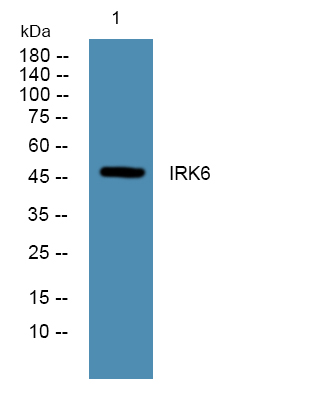KIR3.2 Polyclonal Antibody
- Catalog No.:YT6178
- Applications:IHC;IF;WB
- Reactivity:Human;Mouse;Rat
- Target:
- KIR3.2
- Fields:
- >>Circadian entrainment;>>Retrograde endocannabinoid signaling;>>Cholinergic synapse;>>Serotonergic synapse;>>GABAergic synapse;>>Dopaminergic synapse;>>Estrogen signaling pathway;>>Oxytocin signaling pathway;>>GnRH secretion;>>Morphine addiction
- Gene Name:
- KCNJ6 GIRK2 KATP2 KCNJ7
- Protein Name:
- KIR3.2
- Human Gene Id:
- 3763
- Human Swiss Prot No:
- P48051
- Immunogen:
- Synthesized peptide derived from human KIR3.2
- Specificity:
- This antibody detects endogenous levels of human KIR3.2
- Formulation:
- Liquid in PBS containing 50% glycerol, 0.5% BSA and 0.02% sodium azide.
- Source:
- Polyclonal, Rabbit,IgG
- Dilution:
- IHC 1:50-200, WB 1:500-2000. IF 1:50-200
- Purification:
- The antibody was affinity-purified from rabbit antiserum by affinity-chromatography using epitope-specific immunogen.
- Concentration:
- 1 mg/ml
- Storage Stability:
- -15°C to -25°C/1 year(Do not lower than -25°C)
- Other Name:
- G protein-activated inward rectifier potassium channel 2 (GIRK-2;BIR1;Inward rectifier K(+) channel Kir3.2;KATP-2;Potassium channel, inwardly rectifying subfamily J member 6)
- Observed Band(KD):
- 48kD
- Background:
- This gene encodes a member of the G protein-coupled inwardly-rectifying potassium channel family of inward rectifier potassium channels. This type of potassium channel allows a greater flow of potassium into the cell than out of it. These proteins modulate many physiological processes, including heart rate in cardiac cells and circuit activity in neuronal cells, through G-protein coupled receptor stimulation. Mutations in this gene are associated with Keppen-Lubinsky Syndrome, a rare condition characterized by severe developmental delay, facial dysmorphism, and intellectual disability. [provided by RefSeq, Apr 2015],
- Function:
- function:This potassium channel may be involved in the regulation of insulin secretion by glucose and/or neurotransmitters acting through G-protein-coupled receptors. Inward rectifier potassium channels are characterized by a greater tendency to allow potassium to flow into the cell rather than out of it. Their voltage dependence is regulated by the concentration of extracellular potassium; as external potassium is raised, the voltage range of the channel opening shifts to more positive voltages. The inward rectification is mainly due to the blockage of outward current by internal magnesium.,similarity:Belongs to the inward rectifier-type potassium channel family.,subunit:Associates with GIRK1 or GIRK4 to form a G-protein-activated heteromultimer pore-forming unit. The resulting inward current is much larger.,tissue specificity:Most abundant in cerebellum, and to a lesser degree in islet
- Subcellular Location:
- Membrane; Multi-pass membrane protein.
- Expression:
- Most abundant in cerebellum, and to a lesser degree in islets and exocrine pancreas.
- June 19-2018
- WESTERN IMMUNOBLOTTING PROTOCOL
- June 19-2018
- IMMUNOHISTOCHEMISTRY-PARAFFIN PROTOCOL
- June 19-2018
- IMMUNOFLUORESCENCE PROTOCOL
- September 08-2020
- FLOW-CYTOMEYRT-PROTOCOL
- May 20-2022
- Cell-Based ELISA│解您多样本WB检测之困扰
- July 13-2018
- CELL-BASED-ELISA-PROTOCOL-FOR-ACETYL-PROTEIN
- July 13-2018
- CELL-BASED-ELISA-PROTOCOL-FOR-PHOSPHO-PROTEIN
- July 13-2018
- Antibody-FAQs
- Products Images

- Western blot analysis of lysates from KB cells, primary antibody was diluted at 1:1000, 4°over night



